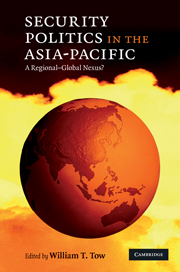Book contents
- Frontmatter
- Contents
- List of illustrations
- About the contributors
- Preface
- Acknowledgements
- List of abbreviations
- 1 Setting the context
- Part I
- Part II
- 6 Hegemony, hierarchy and order
- 7 Democracy and security in East Asia
- 8 Security community-building in the Asia-Pacific
- 9 Human security and global governance
- 10 The economics–security nexus in the Asia-Pacific region
- Part III
- Part IV
- References
- Index
8 - Security community-building in the Asia-Pacific
Published online by Cambridge University Press: 05 June 2012
- Frontmatter
- Contents
- List of illustrations
- About the contributors
- Preface
- Acknowledgements
- List of abbreviations
- 1 Setting the context
- Part I
- Part II
- 6 Hegemony, hierarchy and order
- 7 Democracy and security in East Asia
- 8 Security community-building in the Asia-Pacific
- 9 Human security and global governance
- 10 The economics–security nexus in the Asia-Pacific region
- Part III
- Part IV
- References
- Index
Summary
The ‘pluralistic security community’ concept as it applies in the Asia-Pacific region is based on the assumption that individual states can relate to one another more positively as their values and interests converge. In particular, the notion of a ‘pluralistic’ security community recently developed by Emanuel Adler and Michael Barnett (1998: 30) of ‘a transnational region comprised of sovereign states whose people maintain dependable expectations of peaceful change’ is examined. Concrete instances of viable regional security communities now exist around the world and the Association of Southeast Asian Nations (ASEAN) is arguably one such case (Acharya 2001). Political realists still question whether states will ever overcome historical or structural rivalries to eventually form a multilateral security community on a regional scale. Reconciling those interests that usually shape state-centric rivalries with norms and values that often serve as preconditions for underwriting the security community-building process is the key to overcoming those tensions that most often impede security communities from evolving.
History suggests that economic interests may help pacify relations among states. This material condition alone, however, remains insufficient for the building and maintenance of security communities (Bearce 2003; Nye 1988). Can states build security communities only when they share economic interests, as commercial pacifists and institutional functionalists (or regional integrationists) lead us to believe (Glosny 2006; Green and Self 1996; Rohwer 1995; Rosecrance 1986, 1999; Teo Chu Cheow 2004; Tsunekawa 2005)? Some neo-classical realists even argue that weak states tend to ‘bandwagon’ with hegemons ‘for profit’ (Schweller 1994).
- Type
- Chapter
- Information
- Security Politics in the Asia-PacificA Regional-Global Nexus?, pp. 144 - 166Publisher: Cambridge University PressPrint publication year: 2009
- 6
- Cited by



